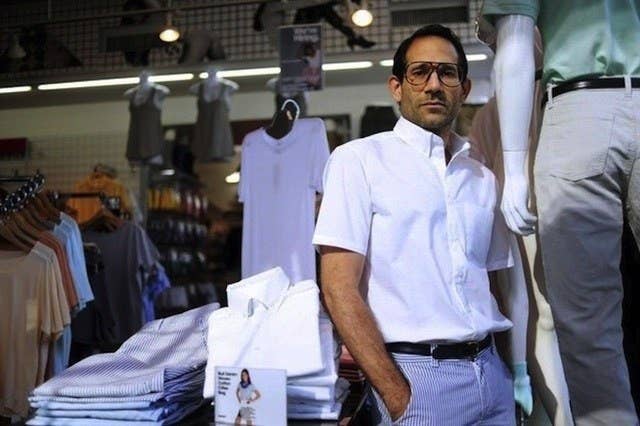
Dov Charney, the corporate anti-hero founder of American Apparel, knows it's over. He is losing his company, a sort of fiscal penance for a lifetime of well-documented perversion.
But in perhaps his last move as an American Apparel shareholder, Charney is making a play for martyrdom. He's doing this through an extraordinarily rare partnership under which he has ceded authority over his 43% stake in American Apparel to the hedge fund Standard General. Charney already owned 27% of the company and he disclosed in a regulatory filing last week that Standard General loaned him the money to buy another 16% stake in return for granting it sole discretion over how the shares are voted with respect to company decisions. The partnership is an astute bit of corporate maneuvering by Charney, forcing American Apparel's board of directors — the very people who ousted him — to indirectly deal with at least some of his wishes as part of any change of control scenario.
According to multiple reports over the weekend, American Apparel's board is in talks with Standard General to raise new funding that would allow the company to pay off a $10 million loan from one of its lenders, Lion Capital. As part of the proposed deal, Standard General is likely to take majority control of American Apparel's board.
Charney told the New York Times last week that he granted Standard General such unprecedented control "so they could protect the company and all of its stakeholders, particularly the employees. The least important thing was me. I know that will be dealt with fairly later."
Whether Charney returns to American Apparel or not hinges on the outcome of an investigation being led by an independent outside consulting firm. No future role for him in the company is guaranteed, a provision he agreed to as part of the deal with Standard General. What Charney is essentially doing is sacrificing any involvement with American Apparel on the condition, according to the Times report, that Standard General agrees to keep core aspects of the company's business model, among them a commitment to paying American Apparel employees a living wage and staying true to its "Made in the U.S.A." tradition.
Not unlike Charney himself, American Apparel has two distinct identities. There is the edgy, hyper-sexualized, sun-kissed, Los Angeles cool aesthetic of the brand, which mirrors the exhibitionistic, chauvinistic, and legally questionable approach to gender relations that got Charney fired from the company in the first place. And then there are the manifestations of Charney's personal views in the company's commitment to corporate responsibility, such as fair labor standards, paying a living wage, creating jobs by keeping manufacturing domestic, and support for progressive causes like environmentalism and gay rights that are often overshadowed by his antics.
The partnership with Standard General is Charney's attempt to remind people of his long forgotten idealism and why he was voted a finalist for Time's "Most Influential People in the World" list in 2009. It is his best worst option. He can't regain control and he has no influence with the board. At 27%, his sole ownership stake, though large, still made him a minority investor. Without a partner, he would be outgunned in a proxy battle. Charney's done the most he could with his little leverage, which is to reach a deal with Standard General to uphold some of the core values on which he founded the company and hope the hedge fund can reach a similar deal with the board.
At the same time, the American Apparel board appears to be softening its stance toward a sale. For starters, they hired investment bank Peter J. Solomon as advisers, which typically signals at least a willingness to consider a sale if the price is right. And while the board has maintained that it isn't interested in pursuing a sale, new co-chairman Allan Mayer did concede to BuzzFeed that one is possible "if someone were to pay an exorbitant sum of money." On the surface, the comment seems flippant, but the board's recent move to enact a "poison pill" suggests that it's not. As The Wall Street Journal's "Dealpolitik" column points out, one of the main reasons to enact a "poison pill" is "to prevent a group of shareholders from gaining control over a company without paying a control premium to all shareholders."
Moreover, last week the New York Post reported that another lender, Monarch Alternative Capital, is already lobbying for a sale behind the scenes that envisions licensing out the American Apparel name and moving production overseas. With no dual class share structure, no voting control, credit lines contingent on Charney being in charge, and amid a frenzy of hedge fund activism to takeover boards or force sales, it seems only a matter of time before American Apparel gets sold.
Charney's deal with Standard General puts pressure on American Apparel's directors to consider proposals to take over the company that are based at least as much on principles as on dollar amount. No board wants to be responsible for doing a deal that reduces pay wages for employees and ships domestic jobs overseas.
It seems to be working. In a statement provided to the Times last week, Mayer said that from the start the board's goal has been "to find new leadership for American Apparel that's not only smart about the business, but also committed to the principles on which the company was built."
A deal between Standard General and the board would allow Charney to salvage all the best parts of what American Apparel stands for while new management would certainly retire all of the crude symbols for which it has become identified.
The last great thing Charney can do for American Apparel is get out of the way. Even he knows that now.
